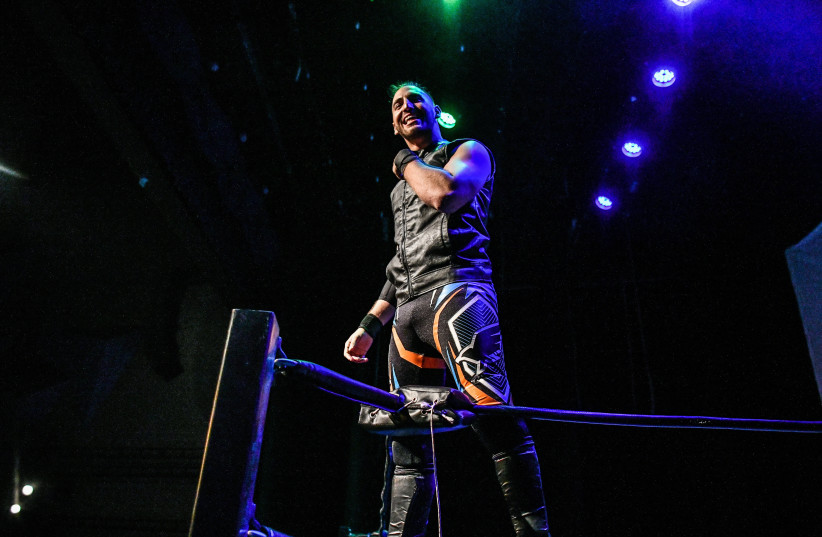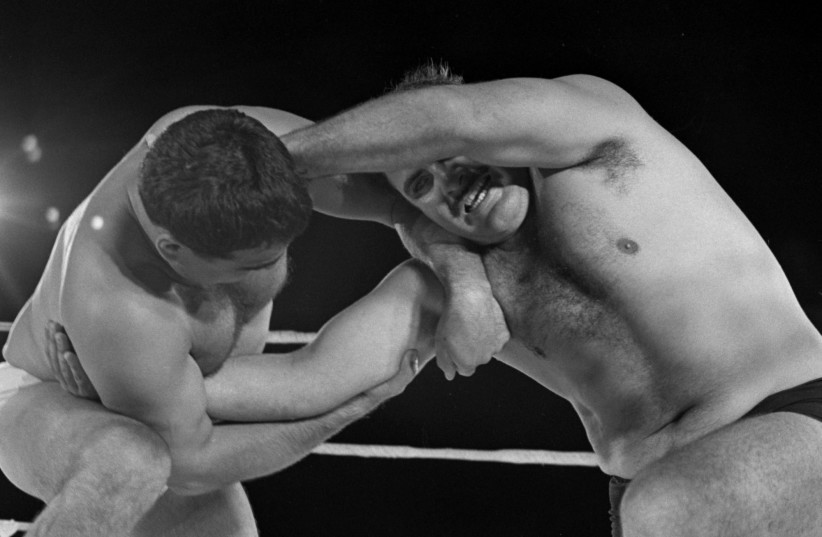
Professional wrestling is one of the most unique art forms on Earth. It is a combination of live-action stunt work and physical storytelling that, on the surface, appear to be superficial scripted clashes between actors attempting to put on a veneer of legitimacy, but in actuality, are compelling performances of athleticism, acrobatics and rhetoric that can result in some of the most engaging forms of entertainment.
It is no surprise, therefore, that since pro wrestling’s humble roots in traveling carnival shows, such staged clashes between larger-than-life characters have become a multibillion-dollar industry with major performances beloved by hundreds of millions of people worldwide.
And Israel is no exception in this regard.
Though its fan base is far smaller than in other countries, pro wrestling still holds a place in Israel with a small but passionate fan base.
A history
Professional wrestling in Israel was largely popularized by Rabbi Rafael Halperin, a Vienna-born haredi Israeli who made a name for himself wrestling in the US in the 1950s for the Capitol Wrestling Corporation, a promotion that would later go on to become World Wrestling Entertainment (WWE), currently the largest wrestling promotion in the world.
Taking on the gimmick, or wrestling persona, as the “Rasslin Rabbi,” he became relatively popular in the American wrestling scene before coming back to Israel and bringing the sport’s popularity with him.
Halperin’s popularity was so significant that in his last-ever match in 1973, he managed to sell out Tel Aviv’s Yad Eliyahu Arena to an audience eager to see him take on the “Jordanian Tiger,” Abu Antar.
In subsequent years, Halperin built up a career as a businessman, rabbi, religious scholar and even an aspiring politician. Most famously, aside from his wrestling career, his most enduring legacy was the establishment of the successful chain of optometrist stores, Optica Halperin, which has multiple locations throughout Israel.
Meanwhile, wrestling has continued to enjoy some popularity in Israel.
The most popular wrestlers in the Jewish state during the 1980s were the Von Erichs, a wrestling family from Texas whose promotion, World Class Championship Wrestling (WCCW), was broadcast locally. Two of them, Kevin Von Erich and Mike Von Erich, even came to Israel in the late 1980s. One of the WCCW championship belts is even on permanent display at Dizengoff Center to this day, and Kevin still expresses his love and appreciation of Israel – in fact, the last match of his career was held in Israel, in 2017.
In 1994, the World Wrestling Federation (WWF), which would later become WWE, had a few live events in Israel. This even saw some prominent wrestlers have appearances on Israeli TV programs. In one memorable instance, Shawn Michaels, remembered as arguably one of the greatest professional wrestlers in history, even had a mock bout with then-TV personality and current Transportation Minister Merav Michaeli on a Channel 2 broadcast. Another show, Mokash, saw children interview the legendary “Macho Man” Randy Savage.
But professional wrestling saw a decline in Israel around this time.
This was because, in 1994, the broadcasting authority commissioned Prof. Dafna Lemish to study a possible link between professional wrestling and injuries among children. In her study, she determined that such a link did exist, with children likely to imitate what they see on TV.
This led to one channel stopping all pro wrestling broadcasts entirely, with another airing it only with a “don’t try this at home” warning at the beginning. However, pro wrestling never fully died out in Israel, and the birth of a local scene soon followed.
The local scene
The heart of the wrestling scene in Israel is, arguably, the local scene – not just fans of big-name promotions, but local promotions raising homegrown talent.
There are a few small promotions in Israel, but at the very center of it is the Israel Pro Wrestling Association (IPWA), founded by Gery Roif.
Roif has a fascinating story on how he started up his own wrestling promotion and wrestling career.
Professional wrestling was actually banned in his birthplace of the Soviet Union, so the only way one could follow it was if someone was able to bring tapes and magazines in from abroad.
This was exactly how Roif, who was already training in freestyle and Greco-Roman wrestling, was first exposed to pro wrestling.
“I saw wrestling on tapes and in magazines, I saw Hulk Hogan, and I was hooked,” he recounted to the Magazine.
Years later, when he made aliyah in the 1990s, pro wrestling became more accessible.
“As I grew older, I worked my ass off at various jobs so I could save money to get as much wrestling content as I could,” he explained. “I’ve got probably thousands of tapes from Lou Thezs, Buddy Rogers, Giant Baba, Antonio Inoki, George Gorgeous, Mitsuhara Misawa – all the greats. I’ve seen pretty much everything.
“That was my world. It’s what I wanted to do. So since there were no promotions in Israel, when I became older I decided to create one of my own.”
After training under New York area wrestler Thunderbolt Norton, Roif would establish IPWA in 2001. Roif, the promoter and owner, would also wrestle under the gimmick of Rabbi Swissa, paying homage to Halperin.
“He was the pioneer of professional wrestling in Israel, and the gimmick of Rabbi Swissa is like a tribute to him,” Roif said of Halperin. “He was very over from the Jewish community in the New York era” – the term “over” being wrestling jargon for popular.
The promotion had its first show in 2002 and then a few more in the following years. Its first big break came in 2005, after which the IPWA roster would star in the wrestling/satire series Makat Medina. The show lasted only one season, due to budget issues, but it still gave the IPWA greater recognition throughout the country. The next year, IPWA’s Wrestlenovella event was aired on The Wrestling Channel, a British combat sports channel now known as The Fight Network.
An attempt was also made to bring WWE back for shows in Israel in 2006. Over 22,000 tickets were sold for these shows, but unfortunately it was canceled, due to the Second Lebanon War.
Over the following years, Roif and IPWA organized a number of shows in Israel. They even had a training center to help raise new Israeli talent. However, financial issues once again got in the way, and Roif was forced to temporarily close IPWA’s doors.
But Roif kept working at it, making connections in the wrestling industry.
Then, in 2017, he put together the Rage Megashow, the biggest wrestling show Israel had seen in over 20 years.
Organized by Doron Degani, Egoeast Production, Lidor Bushary and Eitan Levy, it saw Roif host a number of wrestlers from abroad, including former big WWF superstars like Tatanka and Marty Jannetty, as well as established Jewish-American wrestler Matt Syda at Heichal Shlomo arena. It also saw the aforementioned retirement match of Kevin Von Erich.
The crowd was relatively small, just around 1,000 people, but they were passionate, the enthusiasm present throughout the show.
Two years later, in 2019, IPWA came back, this time hosting Jay Lethal, the record-setting world champion of the major international promotion Ring of Honor, as well as seeing Roif himself defend the IPWA title against Sydal.
This was a stellar show with an equally passionate crowd, but it also saw a focus on the local talent, something that would become a theme of the shows in the following years.

Standing at the top of this crop was Yuval Goldshmit, who quickly rose to the peak of the Israeli wrestling scene since 2019.
“The last few years were great for me!” Goldshmit said. “I got to wrestle in the US and all around Europe. I faced some big names in the industry such as Sammy Guevara, Matt Sydal, and more.”
This momentum built up to IPWA’s most recent show, WrestleMitzvah. This was a long-awaited show for the promotion, with COVID-19 having put a lot of their plans on the back burner.
The show featured the first-ever IPWA women’s championship match, Goldshmit going against British wrestler Cara Noir to become the No. 1 contender for Sydal’s title, and most interestingly of all, Rabbi Swissa’s retirement match, with the man arguably at the center of Israeli wrestling now ready to hang up the boots once and for all.
But for Roif, this was to be expected.
“I love wrestling, but there are only so many places on the card.”
Gery Roif
“I love wrestling, but there are only so many places on the card,” he explained, adding that he wants to be more involved in producing the shows. Not only that, but age and injuries have put considerable strain on the 41-year-old pro wrestler, who suffered a severe injury in 2019.
“I shattered vertebrae in my spine; my guts pretty much exploded,” he recalled. “Wrestling is not worth it to get injured and not be able to play with my kids, or even worse. That pretty much made my decision to hang up the boots.”
Financial issues and a forced retirement have taken their toll, and it seems IPWA is now up for sale. But the dream of keeping professional wrestling alive in Israel isn’t dead, not as long as there are those here who are willing to fight for it.
And Goldshmit is one of them.
“I would love to see a good wrestling academy that will bring fresh faces to the scene, more wrestling shows that will bring more fans, and that one day, professional wrestling will be as big as any other sport here in Israel.”
Yuval Goldshmit
“We have so many great talents here, but I believe there’s a lot of room for improvement,” he said. “I would love to see a good wrestling academy that will bring fresh faces to the scene, more wrestling shows that will bring more fans, and that one day, professional wrestling will be as big as any other sport here in Israel.” ■









